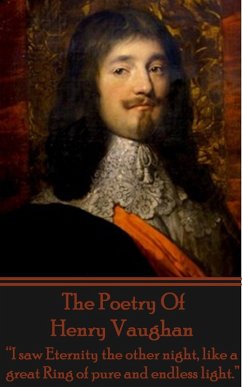Henry Vaughan was a Welsh physician and much admired metaphysical poet. Vaughan spent most of his life in the village of Llansantffraed, near Brecon. He was schooled locally before progressing to Jesus College, Oxford in 1638. Family pressure for him to pursue a career in Law meant acceding to that request in 1640. Vaughan's continuing study of the law was also interrupted by military service and upon his return from this he now began to practice medicine. By 1646, he had married Catherine Wise with whom he reared a son, Thomas, and three daughters, Lucy, Frances, and Catherine. In 1647 Henry Vaughan and his family decided to live in the country. It was here he wrote Olor Iscanus, the (Swan of Usk) which lay unpublished until 1651. The period shortly preceding the publication of Henry Vaughan's Silex Scintillans marks an important period of his life. Vaughan interprets this experience to be an encounter with death and believes he is spared to make amends and start a new course not only in his life but in the literature he would produce. It is with Vaughan's conversion and the writing of Silex Scintillans that he now receives significant acclaim. He was greatly indebted to George Herbert, who provided a model for Vaughan's newly founded spiritual life and literary career, in which he displays "spiritual quickening and the gift of gracious feeling" derived from Herbert. Vaughan elaborated on personal loss in two well-known poems, "The World" and "They Are All Gone into the World of Light." Another poem, "The Retreat," combines the theme of loss with the corruption of childhood, which is yet another consistent theme of Vaughan's and which we collect here amongst the poetry volume. As is so often the case greatness is bestowed only after death and Henry Vaughan alas falls into that category. He died on April 23, 1695, aged 74 and is buried in the churchyard of St Bridget's, Llansantffraed, Powys.
Dieser Download kann aus rechtlichen Gründen nur mit Rechnungsadresse in D ausgeliefert werden.


